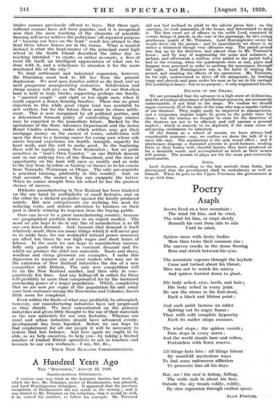A Hundred Years Ago
THE "SPECTATOR," AUGUST 22, 1829.
ARISTOCRATICAL OPPRESSION.
A curious case was tried at the Leicester Assizes last week, in which the Rev. Mr. Trimmer, rector of Buclmainster, was plaintiff, and Lord Huntingtower defendant. It appeared that the previous incumbent of Buckininster did not reside in the rectory ; and it was hinted to Mr. Trimmer on his induction, that it would be well, if he valued his comfort, to follow his example. Mr. Trimmer
did not feel inclined to yield to the advice given him • on t, to
contrary, he took possession of the house, and determined keep' it. The first overt act of offence to the noble Lord, consisted in certain firings of pistols, in the rear of the parsonage, by two young gentlemen, pupils of Mr. Trimmer. Lord Huntingtower swore he' would drive out the parson ; and he immediately set about it, rather a whimsical though very offensive way. The parish pound' was dug up by his direction, and placed close to Mr. Trimmer'il house • and by way of augmenting the noise and nuisance jackass, and afterwards a stallion, were added to the parish bi;111' and in the evening, when the quadrupeds were at rest, pipes an ,d1 beggars were procured in other to prolong the annoyance throughi" the night. Lord Huntingtower was in the habit of visiting the pound, and marking the effects of his operations. Mr. Trimmer; ' on his side, endeavoured to drive off his antagonist, by beating , tongs and shovels and pans under his nose as he sat in his carriage (his Lordship is lame)—but to no purpose ; it only augmented his ire;
DECLINE OF THE DRAMA.
We are persuaded that the advance to a high state of civilization; and the attendant abundance of intellectual resources, are necessarily unfavourable, if not fatal to the stage. We confess we should augur extremely ill of the taste of the man who was a regular visitor of our theatres. They might easily be improved in management; and a temporary impulse might be given to the public taste for them ; but the reasons we imagine to exist for the desertion of the theatres are not to be affected, and will operate a general neglect ; which is scarcely to be deplored, if the main cause of advancing civilization be admitted.
Of the drama as a school of morals, we have always had considerable mistrust—nay, we confess we deem the talk of it a mere idle cant. The amusement is the only moral effect ; and if playhouses disgorge a thousand persons in good-humour, sending them to their homes with cheerful hearts, they have produced so far a desirable result, and accomplished as much as their means will permit. The morals of plays are for the most part extremely questionable.
Lord Amherst, according to the last arrivals from India, has determined that the government shall be ambulatory as well as himself. When he goes to the Upper Provinces the government is to go with him.






























 Previous page
Previous page